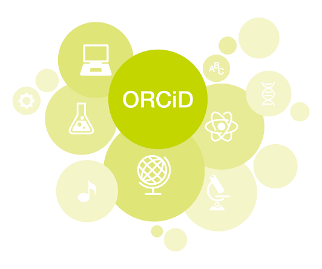ORCID (Open Researcher and Contributor ID)
This page introduces ORCID and answers FAQs about ORCID. For using Pure ORCID functionality see Pure and ORCID.

About ORCID
ORCID (Open Researcher and Contributor ID) provides researchers and authors with a unique ID that can be used throughout research and publishing lifecycles. Open to all, non-profit and community-driven - ORCID is a non-proprietary standard maintained by the scholarly community for the benefit of research and researchers. It is of value to all career stages, from postgraduate research student to senior academic.
Accurate researcher attribution is a common problem. Names are not unique, they can be written in many different ways and they can change over time. ORCID addresses this problem by allocating each researcher a unique numerical identifier and by making this registry publicly available and searchable.
The University strongly encourages all academic staff and postgraduate research students to sign up to ORCID.
Get an ORCID iD
Getting an ORCID iD takes less than two minutes. We recommend creating one from within Pure or (if you already have one) adding it to Pure. This will help the exchange of research information between Pure and other systems. All ORCID iDs in Pure will appear on Explore Bristol Research, on researcher profiles and publication pages.
Use your ORCID iD
Publications
Once you have an iD you can use it to assert your authorship of outputs and other research activities. We recommend that you quote your iD when submitting a publication to a journal, whenever the submission system allows.
We also recommend that you link your iD to your name in pre-print systems and services such as arXiv. You can also link your ORCID iD to your name in bibliographic databases such as Scopus. Quoting your iD when submitting or uploading your work increases your chances of being accurately identified as the author of your publications.
- List of publishers who require ORCID iDs upon submission
- Link your arXiv account to ORCID
- Scopus - Adding author details to ORCID
Funding
UKRI encourage applicants to add their ORCID to the Je-S application system and any iDs in Je-S are made visible on Gateway to Research. The Wellcome Trust and some NIHR programmes now require applicants to have ORCID iDs. Funder-specific information:
Going further: if you have a Researchfish account, you can connect ORCID to Researchfish for a two-way exchange of publication data. You will be prompted to connect your ORCID account when you first log into Researchfish.
What ORCID isn't
ORCID is not an institutional repository. It does not host full text documents and it cannot be a route to Open Access compliance. You will still need to upload your publication information to Pure, as detailed in the University's Open Access policy.
ORCID can collect lists of your outputs and projects, however, its primary use is not as an online CV or profiling system. Instead, the focus is on using the unique iD to ease the flow of information between research systems.
We recommend you set up links with trusted sources, to push information automatically to ORCID, rather than curate your ORCID web profile manually. You can link Pure to ORCID so that ORCID is updated whenever new (published) works are added to Pure.
Help
The University's ORCID initiative is managed by the RED research policy team. Contact orcid-help@bristol.ac.uk if you have questions about ORCID or would like help. We can give talks about the benefits of ORCID to your Group or School.
A promotional ORCID leaflet (PDF, 136kB) is available.
